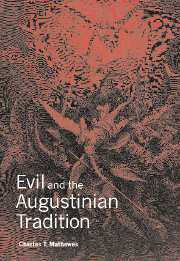Book contents
- Frontmatter
- Contents
- Acknowledgments
- List of abbreviations
- Introduction: reaching disagreement
- I PRELIMINARIES: EVIL AND THE AUGUSTINIAN TRADITION
- II GENEALOGY: REMEMBERING THE AUGUSTINIAN TRADITION
- 3 Sin as perversion: Reinhold Niebuhr's Augustinian psychology
- 4 Evil as privation: Hannah Arendt's Augustinian ontology
- III THE CHALLENGE OF THE AUGUSTINIAN TRADITION TO EVIL
- Conclusion: realizing incomprehension, discerning mystery
- Works cited
- Index
3 - Sin as perversion: Reinhold Niebuhr's Augustinian psychology
Published online by Cambridge University Press: 22 September 2009
- Frontmatter
- Contents
- Acknowledgments
- List of abbreviations
- Introduction: reaching disagreement
- I PRELIMINARIES: EVIL AND THE AUGUSTINIAN TRADITION
- II GENEALOGY: REMEMBERING THE AUGUSTINIAN TRADITION
- 3 Sin as perversion: Reinhold Niebuhr's Augustinian psychology
- 4 Evil as privation: Hannah Arendt's Augustinian ontology
- III THE CHALLENGE OF THE AUGUSTINIAN TRADITION TO EVIL
- Conclusion: realizing incomprehension, discerning mystery
- Works cited
- Index
Summary
How cold the vacancy
When the phantoms are gone and the shaken realist
First sees reality. The mortal no
Has its emptiness and tragic expirations.
The tragedy, however, may have begun,
Again, in the imagination's new beginning,
In the yes of the realist spoken because he must
Say yes, spoken because under every no
Lay a passion for yes that had never been broken.
Wallace Stevens, “Esthétique du Mal,” VIIIHow plausible is the Augustinian proposal to interpret human wickedness in terms of perversion? For some, the emphasis on perversion does not take the human's capacities for change seriously enough; it represents a conservative and pessimistic obeisance to obsolete and absolutist beliefs about human nature, beliefs which restrain social experimentation and, therefore, progress. For others, it does not take the human's “naturalness” seriously enough; it reflects a fantastically optimistic delusion about our rectitude, and irresponsibly ignores the fact that we inhabit a world, and possess a nature, that is only partly aligned with our ethical aspirations. For both optimists and pessimists, then, the Augustinian tradition's insistence on sin as “second nature” is not a source of real hope but an expression of despair laced with self-hatred. Can the Augustinian proposal be developed in a way that meets these worries? Indeed it can, and the very evidence which these critics think the most problematic aspect of the Augustinian proposal – namely, its complex anthropology – turns out instead to support it.
- Type
- Chapter
- Information
- Evil and the Augustinian Tradition , pp. 107 - 148Publisher: Cambridge University PressPrint publication year: 2001



